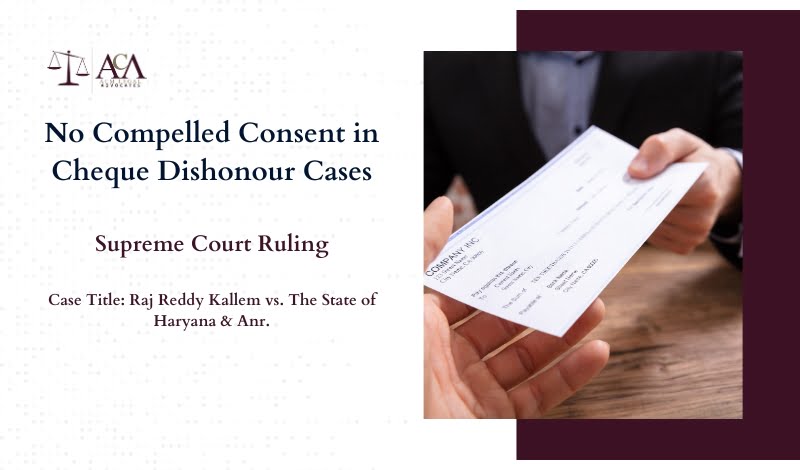Courts Cannot Compel Complainant Consent in Cheque Dishonour Cases
In a recent landmark decision, the Supreme Court of India delivered a significant judgment in the case of Raj Reddy Kallem vs. The State of Haryana & Anr. (Criminal Appeal No. 2210 of 2024), bringing clarity to the legal landscape concerning cheque dishonor cases under the Negotiable Instruments Act (NI Act). The judgment, rendered by a bench comprising Justices AS Bopanna and Sudhanshu Dhulia, addresses crucial aspects such as the compounding of offences, the role of consent, and the discretion of courts in quashing criminal proceedings.
Table of Contents
ToggleBackground of the Case
The case originates from a dispute between the appellant, Raj Reddy Kallem, and the respondent, represented by the State of Haryana. In 2012, the respondent, referred to as the complainant, entered into a purchase agreement with M/s Farmax, a company owned by the appellant, for the supply of a “Promotec Fiber Laser Cutting Machine.” An advance amount of Rs. 1,55,00,000 was paid by the complainant to M/s Farmax for the purchase. However, M/s Farmax failed to fulfill its contractual obligations, leading to the initiation of legal proceedings.
Legal Proceedings
Subsequently, the complainant initiated proceedings under Section 138 of the Negotiable Instruments Act (NI Act) due to the dishonor of cheques issued by the appellant. Additionally, a complaint under Section 156(3) of the Criminal Procedure Code (CrPC) was filed, resulting in the registration of an FIR under Sections 406, 420, and 120B of the Indian Penal Code (IPC) against the appellant.
Conviction and Settlement Attempts
The trial court convicted the appellant under Section 138 of the NI Act and sentenced him to two years of rigorous imprisonment. However, during the appeal stage, efforts were made to settle the dispute amicably. A settlement was reached, stipulating that if the appellant repaid the entire amount of Rs. 1.55 crore, the offences would be compounded or quashed. Despite initial attempts at settlement, the appellant failed to fulfill the terms within the agreed timeframe, leading to the frustration of the settlement. Judicial intervention ensued, with the Supreme Court issuing directives for the appellant to deposit the outstanding amount. Compliance with these orders was ensured through various judicial proceedings.
Legal Observations
The Supreme Court’s judgment delves into critical legal aspects surrounding the compounding of offences under Section 138 of the NI Act. It underscores the significance of consent in compounding, citing previous judgments such as JIK Industries Ltd. v. Amarlal Jamuni and Meters and Instruments Private Ltd. v. Kanchan Mehta. The court elucidates that while compounding requires the consent of both parties, it has the discretion to close proceedings if the complainant has been duly compensated, as affirmed in the Kanchan Mehta case. The court further observed that even though the complainant was fully compensated, the continuation of the criminal proceedings against the appellant would serve no legal purpose and thus, they were quashed.
The Court’s Ruling
In the present case, despite the appellant’s repayment of the entire amount and additional interest of 10 lahks, the complainant expressed unwillingness to compound the offence. However, considering the peculiar circumstances, including the appellant’s prior imprisonment and compliance with court orders, the Supreme Court deemed it appropriate to quash all criminal proceedings against the appellant.
Conclusion
The judgment in Raj Reddy Kallem vs. The State of Haryana & Anr. marks a significant development in the legal framework governing cheque dishonor cases. It reaffirms the importance of consent in compounding offences under the NI Act while recognizing the court’s discretion to quash proceedings based on the totality of circumstances. This decision provides clarity, ensuring fairness and efficiency in the administration of justice.






